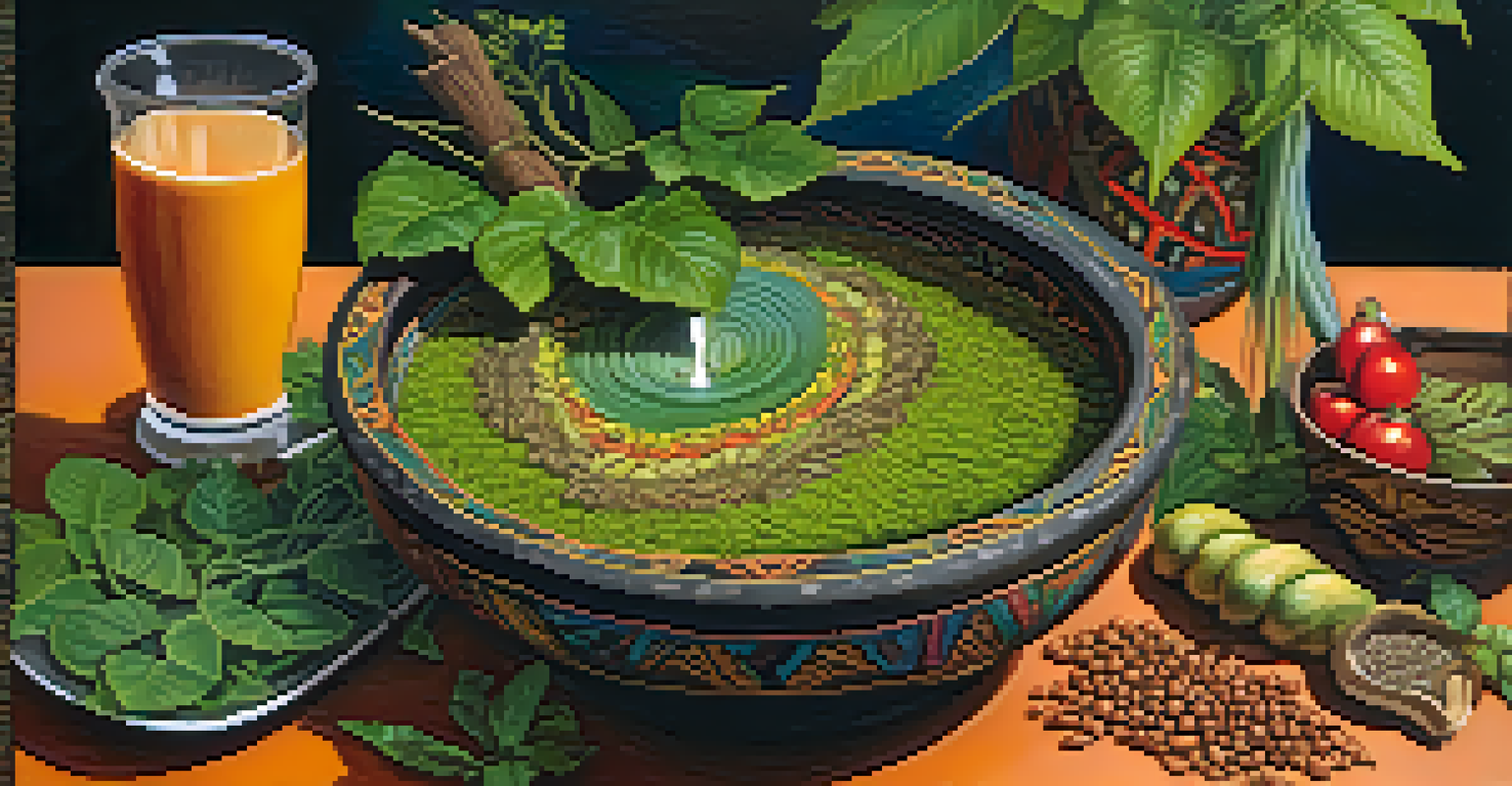Healing Trauma: Ayahuasca's Impact on Mental Health Recovery

Understanding Trauma and Its Effects on Mental Health
Trauma can significantly impact an individual's mental health, leading to issues like anxiety, depression, and PTSD. It often stems from distressing experiences, whether they are acute, like accidents, or chronic, such as abuse. The effects of trauma can linger for years, disrupting daily life and relationships, making recovery feel daunting.
The wound is the place where the Light enters you.
The brain processes trauma differently, often trapping memories and emotions in a way that continues to affect behavior and thoughts. This is why many individuals struggle to move past their painful experiences, as the trauma can manifest in various forms such as flashbacks or emotional numbness. To truly heal, one must confront and work through these buried feelings.
In recent years, alternative treatments are gaining attention, with Ayahuasca emerging as a potential avenue for healing. This traditional Amazonian brew is known for its psychoactive properties and has been used for centuries by indigenous cultures for spiritual and healing purposes. Understanding how Ayahuasca interacts with trauma is critical in evaluating its effectiveness in mental health recovery.
What Is Ayahuasca and How Does It Work?
Ayahuasca is a powerful herbal concoction made from the Banisteriopsis caapi vine and other plants, often containing the hallucinogenic compound DMT. When ingested, it induces altered states of consciousness, allowing users to explore their psyche deeply. This introspective journey can bring hidden emotions and memories to the surface, which is crucial for trauma healing.

The experience of consuming Ayahuasca can be intense, often described as a rollercoaster of emotions. Many participants report experiencing vivid visions and profound insights about their lives and traumas. This process can lead to catharsis, where individuals confront and release pent-up emotions that they may have avoided for years.
Trauma's Lasting Impact on Mental Health
Trauma can lead to long-term mental health issues such as anxiety, depression, and PTSD, often disrupting daily life and relationships.
Moreover, Ayahuasca is believed to stimulate neural pathways related to healing and emotional processing. By enhancing neuroplasticity, it may help individuals rewire their thoughts and behaviors, making it easier to form healthier coping mechanisms. This combination of introspection and neurological benefits makes Ayahuasca a unique therapeutic option.
Anecdotal Evidence: Personal Stories of Healing
Countless individuals have shared transformative stories about their experiences with Ayahuasca. For some, it has provided clarity and understanding about their past traumas, allowing them to finally forgive themselves or others. These personal narratives often highlight how Ayahuasca sessions can lead to profound emotional release, which many traditional therapies may not achieve.
Healing takes time, and asking for help is a courageous step.
One common theme in these stories is the sense of interconnectedness that Ayahuasca induces. Many participants report feeling a deep connection to nature, humanity, and even a higher power during their journeys. This interconnectedness can foster a sense of belonging and purpose, which is often missing in the lives of those struggling with trauma.
However, it's crucial to approach these accounts with a balanced perspective. While many find Ayahuasca beneficial, experiences can vary significantly. For some, the journey may be challenging or bring up uncomfortable emotions, highlighting the importance of proper guidance and integration support following the experience.
The Science Behind Ayahuasca and Mental Health
Research into Ayahuasca's effects on mental health is still in its infancy, but initial studies show promising results. Some research indicates that the brew may help reduce symptoms of depression and anxiety, particularly in those with treatment-resistant conditions. The combination of DMT and MAO inhibitors in Ayahuasca may play a crucial role in this process.
Studies have also demonstrated that Ayahuasca can promote emotional healing by increasing serotonin levels and enhancing neural connectivity. These changes can potentially lead to improvements in mood and emotional regulation. However, it's essential to understand that these results are not universally applicable; individual responses can vary widely based on personal history and context.
Ayahuasca as a Healing Tool
Ayahuasca may offer a unique therapeutic option by promoting emotional healing and enhancing neuroplasticity, allowing individuals to confront buried emotions.
Integrating these findings into a broader understanding of trauma recovery can help mental health professionals consider Ayahuasca as a potential adjunct therapy. As more research emerges, the hope is that it will shed light on how this ancient practice can complement traditional therapeutic approaches.
Setting and Integration: Key Components for Healing
The environment in which Ayahuasca is consumed plays a vital role in the healing process. Traditionally, Ayahuasca ceremonies are held in safe, supportive settings, often led by experienced shamans. This controlled atmosphere allows participants to feel secure while navigating the complexities of their emotional landscapes.
Following an Ayahuasca experience, the integration phase is critical. This involves incorporating insights gained during the ceremony into everyday life, ensuring that participants can apply their newfound understanding. Support groups or therapy can be invaluable during this time, helping individuals process their experiences and avoid feeling overwhelmed.
Without proper integration, the powerful experiences from Ayahuasca may fade or cause confusion. It’s essential for individuals to have a plan in place for how they will continue their healing journey after the ceremony. The combination of a safe setting and effective integration support can significantly enhance the overall benefits of Ayahuasca.
Risks and Considerations When Using Ayahuasca
While many people find healing through Ayahuasca, it’s not without risks. The intense psychological effects can be overwhelming, particularly for those with a history of severe mental health conditions. Individuals may experience anxiety, paranoia, or even traumatic flashbacks during their journey, making it crucial to approach this treatment with caution.
Additionally, the physical side effects can include nausea, vomiting, and diarrhea, which are often referred to as 'purging.' While purging is considered a part of the healing process by many, it can be unsettling for newcomers. Understanding these potential effects beforehand can help set realistic expectations.
The Importance of Safe Integration
Proper setting and integration support are crucial for maximizing the benefits of Ayahuasca, helping individuals effectively process their experiences.
Before participating in an Ayahuasca ceremony, it’s advisable to consult with a healthcare professional, especially for individuals on certain medications or with pre-existing health conditions. Ensuring a thorough understanding of both the benefits and risks is essential for anyone considering this path to healing.
The Future of Ayahuasca in Mental Health Treatment
As interest in alternative mental health treatments grows, Ayahuasca is slowly gaining acceptance within the broader therapeutic community. Ongoing research and clinical studies aim to better understand its efficacy and safety. This attention could pave the way for more structured, evidence-based approaches to using Ayahuasca in mental health recovery.
With the right framework, Ayahuasca could become a valuable tool in the mental health toolkit. Integrating traditional practices with modern therapeutic techniques may offer new hope for those struggling with trauma. The future might see Ayahuasca being utilized alongside other treatments, providing a holistic approach to healing.

However, it's crucial that this exploration is done respectfully and ethically, recognizing Ayahuasca's cultural roots. Ensuring that indigenous practices are honored and protected while exploring their benefits will be vital as we move forward in understanding how Ayahuasca can fit into contemporary mental health care.